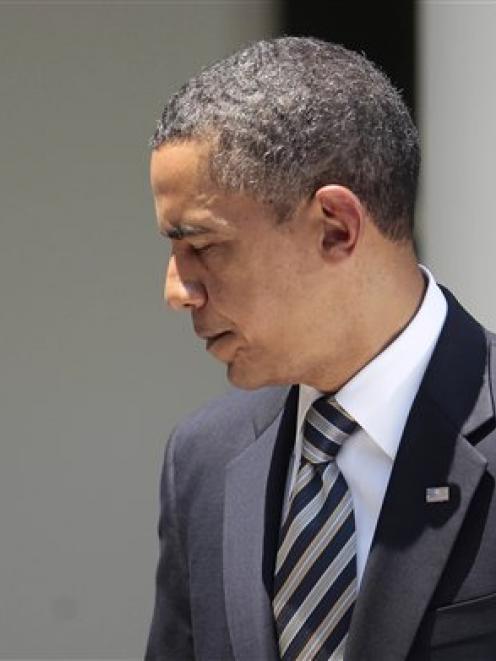
Wall Street crumpled, dismayed by reports of new economic weakness and unimpressed by Congress' prescription. The Dow Jones industrial average sank by 266 points, its eighth straight losing session, and biggest.
The compromise deal to persuade GOP lawmakers to raise the federal debt limit - US borrowing was to collide with it at midnight - will cut federal spending by $2.1 trillion or more over the next decade. But Obama immediately challenged Republicans to accept higher taxes on the wealthy in a second round of deficit cuts this fall. They adamantly refused to accept that idea during the past months' dispute.
A stern-faced Obama said at the White House that action to raise the debt limit had been essential but more - and different - steps were badly needed.
"We've got to do everything in our power to grow this economy and put America back to work," the president said, arguing forcefully for including revenue increases as well as spending cuts in the next round of efforts to trim huge government deficits.
It was the same call the GOP successfully resisted in the bill just approved, and there was little evidence of a change in position.
"The American people agreed with us on the nature of the problem. They know the government didn't accumulate $14.3 trillion in debt because it didn't tax enough," said the party's leader in the Senate, Mitch McConnell of Kentucky.
Obama placed his signature on bill in the privacy of the Oval Office less than two hours after a bipartisan 74-26 vote in the Senate. The House approved the measure Monday night on a 269-161 roll call that also reached across party lines and was sealed by a rap of the gavel by Speaker John Boehner.
The bill allows a quick $900 billion increase in borrowing authority as well as a first installment on spending cuts amounting to $917 billion over a decade.
Without legislation in place by day's end, the Treasury would have been unable to pay all the nation's bills, leading to a potential default for the first time in history. Administration officials warned of disastrous consequences for an economy that shows fresh signs of weakness on a near-daily basis as it struggles to recover from the worst recession in decades.
The White House and congressional leaders said legislation was important to reassure investors at home as well as overseas, and also to preserving the nation's Aaa credit rating. Talk of that rating's precariousness continued nonetheless.
This week's peace pact between the two parties is unlikely to be long-lived.
The bill sets up a powerful 12-member committee of lawmakers with authority to recommend fresh deficit savings from every corner of the federal budget.
Politically sensitive benefit programmes such as Social Security and Medicare will be on the table as the panel of six Republicans and six Democrats works against a Thanksgiving deadline. So, too, an overhaul of the tax code. Congress will have until Christmas to vote on the recommendations without the ability to make changes.
As an incentive for Congress to act, failure to do so would trigger $1.2 trillion in automatic spending cuts, affecting the Pentagon as well as domestic programmes.

